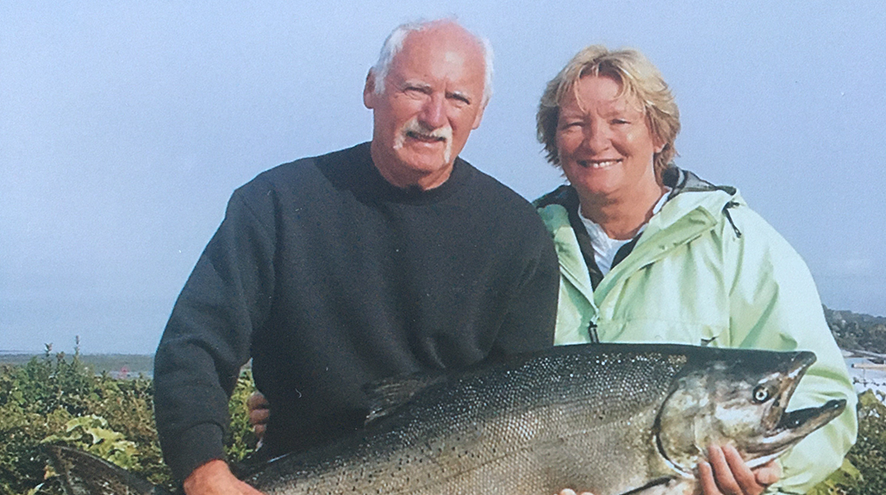Don't change: Emily Doyle's story
Meet one of the British Columbians sharing their stories as part of Alzheimer’s Awareness Month this year.

Throughout January, the Alzheimer Society of B.C. is recognizing Alzheimer’s Awareness Month by highlighting the experiences of British Columbians affected by dementia to say, “Don’t change. Even if they do.” For many people living with dementia and their caregivers, the dementia journey can feel very isolating. Sustaining relationships is essential for the well-being of people facing the disease, whether they live in the community or in long-term care.
This year, British Columbians are sharing their input on the value of staying connected to the people in their lives who are living with dementia or caring for someone who is. Among them is Emily Doyle, a caregiver living in Parksville, B.C.
Emily’s spouse David – a retired heavy-duty mechanic and avid fisherman – was diagnosed with Alzheimer’s disease in 2017. They were referred to a geriatric specialist because David had been experiencing low energy and mobility issues after a bout of pneumonia. “We were shocked,” Emily says. “He didn’t show any memory loss at the time.”
The couple worked with the specialist to see if medications could be used to slow the progression of David’s Alzheimer’s disease, but they ultimately found the side effects outweighed the benefits, including issues with his balance that resulted in him voluntarily giving up his driver’s license.
Though they asked to be evaluated for access to health-care services – including home support, day programs and respite care – in August 2018, David wasn’t evaluated until January 2019. They were told he should be on the wait list for long-term care. Despite this, Emily wanted to keep David home, feeling if they had access to support services, they would be able to manage the situation.
When Emily began having challenges caregiving, the geriatric specialist referred them to the Alzheimer Society of B.C., where she was able to participate in education sessions like the Family caregiver series and Shaping the journey: Living with dementia®. “There was so much good advice – including the suggestion to keep a journal to track the progression,” Emily says. “We got to meet other people going through the same thing – although everybody’s journey is different.” They stayed in contact with other families they met, having lunches and going on walks with them. “That was incredibly helpful at the time.”
Emily and David made a point of trying to stay connected to the people around them, regularly attending family events and their neighbourhood’s happy hour parties until David started to have problems keeping up with conversations and showing changes in behaviour. “People still invited us,” Emily says. “But it became awkward.”
David moved into long-term care in 2019, initially at a care home that was farther away but offered more entertainment and opportunities to keep him engaged. He was scheduled to move closer to Emily in March 2020 but then the pandemic began, which meant he had to stay put. They weren’t able to see each other again for four months, and even then, only through FaceTime. “He didn’t recognize me,” she says.
COVID-19 has continued to be a challenge for Emily and David. While he was moved to a closer care home in September 2020, and visits were limited to outdoor trips where David was often too distracted by his environment for their visits to feel meaningful.
Along the way, Emily has continued to adapt to David’s changing abilities while working to keep him engaged. While he couldn’t play music or fish anymore, she was able to play music that he loved – the Eagles or Rod Stewart – and recording fishing shows for him. As his disease has progressed, that has had to change. “I visit him mostly for meals now,” she says. “He doesn’t talk much, but at least I can chit-chat with him and he’ll laugh if I make a joke about making him put up the Christmas lights, because he never liked doing that.”
Learn more about the campaign
Want to learn more? Read some of the other stories being shared throughout the month and visit dontchange.ca to find out more about the campaign.
